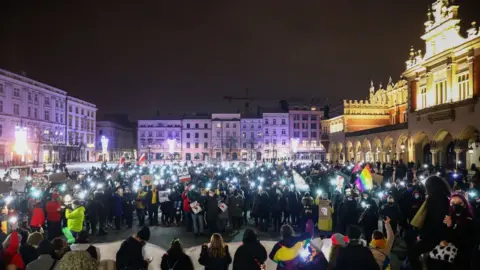Poland enforces controversial near-total abortion ban
 Getty Images
Getty ImagesA controversial near-total ban on abortion in Poland has taken effect, the government announced, with enforcement from midnight on Wednesday.
A court ruling allowing the prohibition prompted huge protests when it was issued in October.
Abortion is now allowed only in cases of rape or incest or when the pregnancy threatens the life of the mother.
The majority of Poles oppose a stricter ban and demonstrations took place in Polish cities on Wednesday evening.
Activists have called for large street protests on Thursday and Friday in the capital Warsaw.
The October ruling by the Constitutional Court found that a 1993 law allowing abortion in cases of severe and irreversible foetal abnormalities was unconstitutional.
In 2019, 98% of abortions were carried out on those grounds, meaning that the ruling effectively banned the vast majority of pregnancy terminations.
The ruling provoked outrage from supporters of the right to abortion.
But Poland's conservative government, which has strong ties to the country's powerful Catholic Church, supports the ruling.
The court justified its ruling on the grounds that "an unborn child is a human being" and therefore it deserves protection under Poland's constitution which ensures the right to life.
Following the announcement that the ruling would now be enforced, groups defied coronavirus restrictions to protest in Warsaw.
Waving red flares and LGBT flags, some carried placards reading "Free Choice, Not Terror".
 Getty Images
Getty Images"I want us to have our basic rights, the right to decide about our bodies, the right to decide what we want to do and if we want to bear children and in what circumstances to have children," one protester, Gabriela Stepniak, told Reuters news agency.
The mayor of Warsaw Rafał Trzaskowski tweeted his opposition to the move, calling on women to reject the decision on the streets.
Leaders of the nationwide Women's Strike movement that opposed the ban wore green headscarves, in a nod to Argentina's women's movement that successfully campaigned to legalise abortion.
Groups who support the ban say it is about the human rights of the child.
"We are very happy that this judgement has been published. It is a great step towards the realisation of human rights of all human beings," Karolina Pawlowska from the Ordo Iuris international law centre told the BBC.
"This also means there will no longer be discrimination against children who are sick or disabled," she said, adding that the court's ruling was in line with the Polish constitution and UN treaties on the rights of the child.
Poland already had some of Europe's most restrictive abortion laws, and around 1,000 legal terminations are performed each year.
An estimated 200,000 women have abortions illegally or travel abroad for the procedure.
